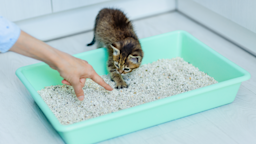Key takeaways:
Veterinarians prescribe Proin (phenylpropanolamine) to treat primary urinary incontinence in cats.
Giving the correct dosage of Proin is key to avoiding side effects such as appetite loss or restlessness.
Primary urinary incontinence is rare in cats, and litter box problems are generally due to other issues. If your cat has urinary problems, talk to your veterinarian.
Save on related medications
Urinary incontinence is a rare condition that occurs when a cat cannot control their bladder. Incontinence results in a cat leaking urine, usually while they are resting. To control urinary incontinence, veterinarians may prescribe Proin (phenylpropanolamine).
If your cat is prescribed Proin, here’s what you need to know.
Proin for cats at a glance
Common names | Proin (phenylpropanolamine) |
What it treats | Urinary incontinence |
How it comes (forms) | Tablet and liquid |
Common side effects | Restlessness, fast heart rate, loss of appetite, diarrhea, vomiting, increased thirst, difficulty urinating |
Average cost | $45 for a 30-day supply |
What is Proin for cats, and how does it work?
Proin is used in cats to control urinary incontinence due to a weak urethral sphincter. Proin stops urine from leaking by tightening the urethral sphincter muscles.
Search and compare options
In normal, healthy animals, urine is kept in the bladder by a closed urethral sphincter that only opens when the cat is actively urinating. In some cats, the tightness of the urethral sphincter can weaken with age, which results in leaking urine.
The active ingredient in Proin for cats is phenylpropanolamine, or PPA for short. In cats, PPA stops incontinence by increasing tone in the muscles of the urethra, urethral sphincter, and neck of the bladder. This closes the urethral sphincter and prevents urine from leaking except for when the cat actively urinates.
Because of the way it works, Proin is not effective in cats that are incontinent due to a neurological condition, anatomical malformations, or other urinary tract disorders.
While Proin is FDA approved for use in dogs, it is not FDA approved for use in cats. However, it can still be prescribed to cats “off-label” if your veterinarian thinks it will help.
How is Proin given for cats?
Proin is available in tablet and oral liquid forms. It is generally given twice daily. Your veterinarian will determine the dosage of Proin that is safe and effective for your cat.
Store the medication at room temperature, and avoid prolonged exposure to light, which can make Proin less effective.
Read more like this
Explore these related articles, suggested for readers like you.
Proin can take several days to a week to stop urine leaks. If you are not seeing results within 1 week of starting the medication, call your veterinarian for advice. Do not increase the dose if your cat is still leaking urine.
There are certain extended release formulations of Proin for use in dogs. Don’t use these in cats.
What are the common side effects of Proin in cats?
When given appropriately, most cats don’t have many side effects with Proin. The most common side effects of Proin in cats include:
Restlessness
Diarrhea
Vomiting
Increased thirst
Loss of appetite
Agitation
Irritability
Difficulty urinating
Holding urine
If you notice these side effects in your cat after starting treatment with Proin, contact your veterinarian for guidance.
Proin is considered a short-acting medication. So any side effects should disappear within 24 to 48 hours after stopping it. But it may take longer in cats that have liver or kidney disease.
What are the most serious risks of Proin for cats?
The most serious risks of Proin are typically related to its effects on the cardiovascular system. These risks are more common in cats that are sensitive to the medication or cats who received an overdose of Proin. These symptoms can include:
Increased resting heart rate
High blood pressure
Incoordination
Difficulty breathing or rapid breathing
Increased body temperature
Tremors or seizures
Collapse
If you notice any of these symptoms in your cat, stop giving the medication and take them to your local veterinarian or emergency clinic immediately.
Because Proin can increase heart rate and blood pressure, do not give it to cats that have been diagnosed with the following conditions:
Diabetes
Heart disease
High blood pressure
Glaucoma
Kidney disease
Proin has not been studied for safety in pregnant or lactating cats, and should not be used in these animals.
Does Proin interact with any other cat medications?
Don’t give Proin to cats that are taking L-Deprenyl (Anipryl, selegiline) due to effects on blood pressure.
Proin can interact with several medications. Use it with caution in cats receiving the following medications:
Tricyclic antidepressants
Nonsteroidal anti-inflammatory drugs (NSAIDs)
Amitraz (Mitaban)
MAO inhibitors
Anesthesia medications
Before your cat is prescribed Proin, tell your veterinarian about any other medications or supplements that your cat takes.
What should you do if your cat misses a dose of Proin?
If you miss giving your cat a dose of Proin, give the next dose as soon as you remember. If it is close to the time that the next dose is due, skip the missed dose and resume your cat’s normal dosing schedule. Never give double doses of Proin to catch up.
If you miss a dose, the medication may lose effectiveness and your cat may dribble urine.
The bottom line
Proin is used to control primary urinary incontinence in cats, which is a rare condition that causes them to leak urine.
Follow all dosing instructions for Proin closely and call your veterinarian if you notice any negative side effects after starting the medication. Common side effects include restlessness, diarrhea, vomiting, increased thirst, and loss of appetite.

Why trust our experts?



References
Brooks, W. (2023). Phenylpropanolamine (Proin). Veterinary Partner.
Brooks, W. (2023). Urinary incontinence in dogs and cats. Veterinary Partner.
Pegasus Laboratories, Inc. (2024). Proin 50 [package insert].
Pet Poison Helpline. (n.d.). Phenylpropanolamine for cats.
Today’s Veterinary Business. (2019). Once-a-day Proin earns FDA approval.
















